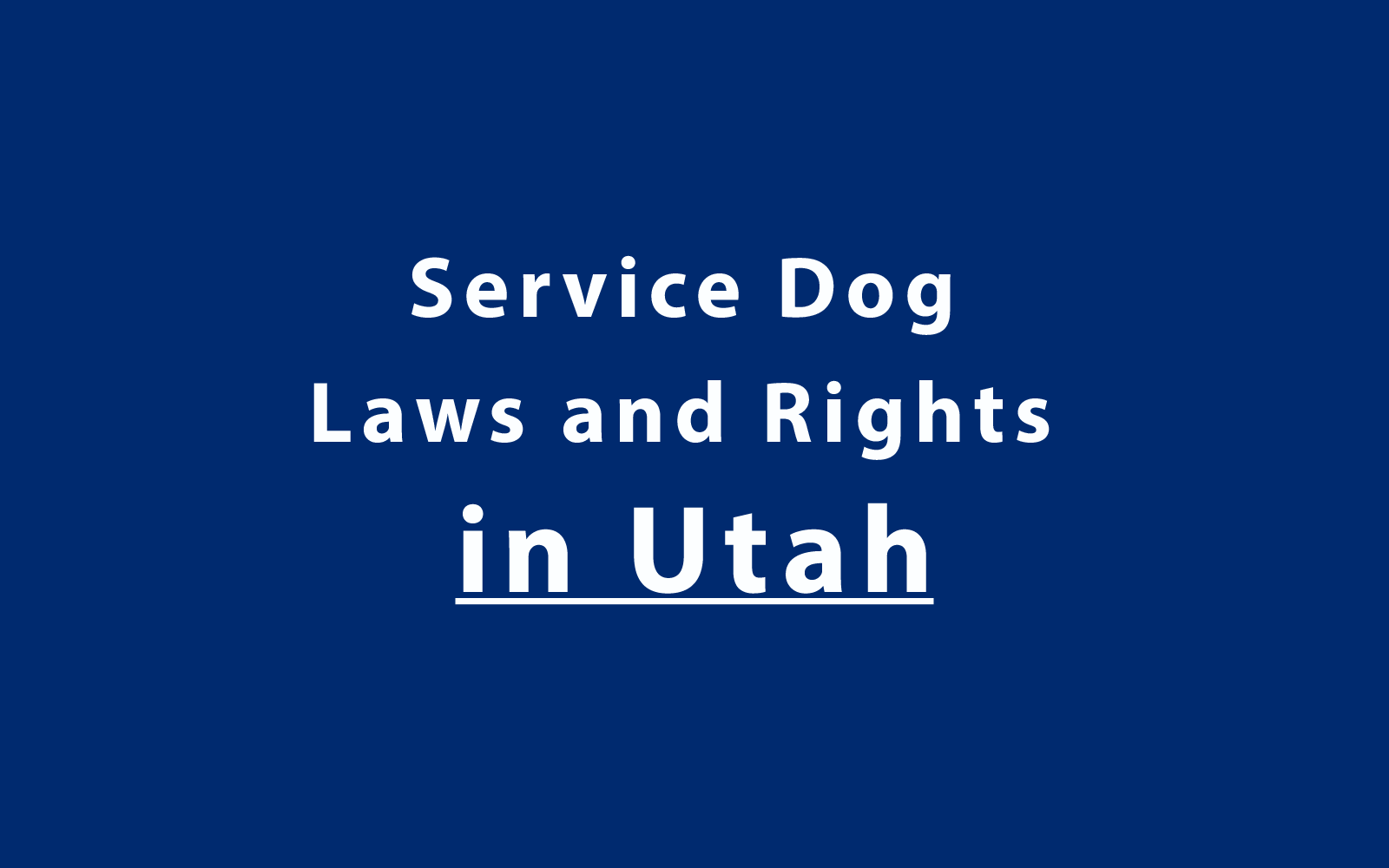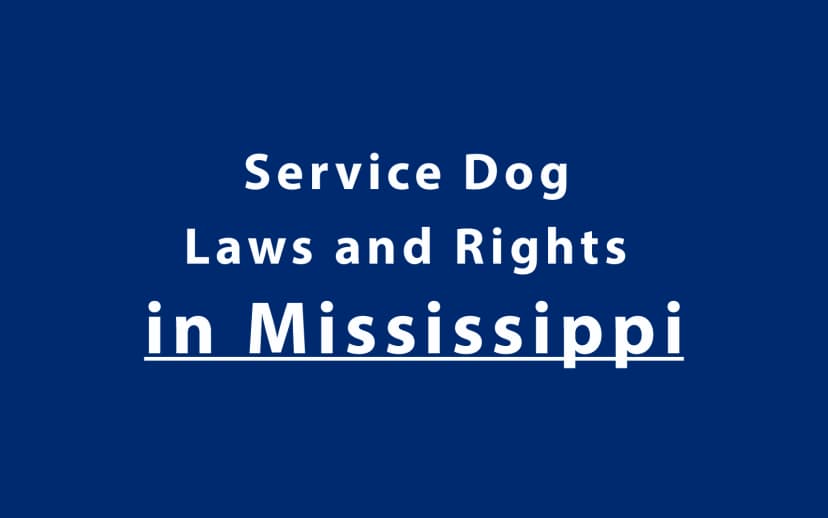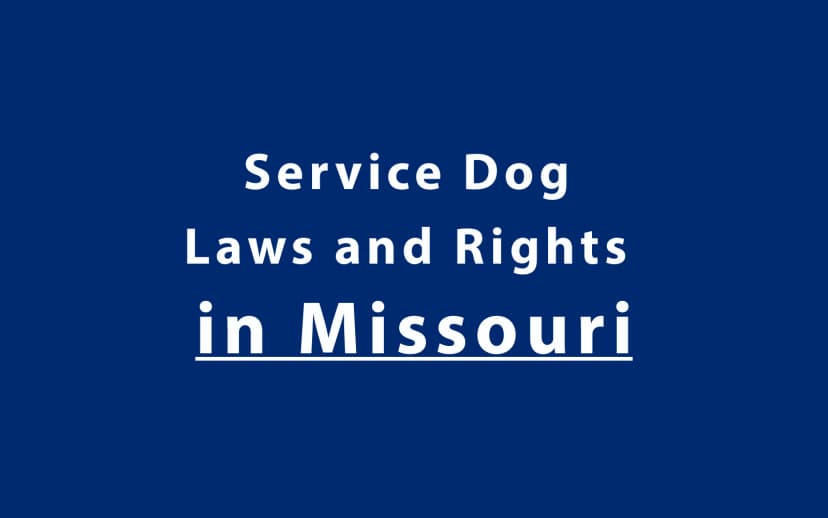Service Dog Laws and Rights in Utah

Service dogs are essential partners to individuals with disabilities, providing life-changing support through task-specific training. In Utah, the rights of service dog handlers are protected by both federal and state laws, ensuring they can live, work, travel, and access public places without discrimination. This 2025 guide outlines the key service dog laws and rights in Utah to help handlers, landlords, employers, and businesses stay informed and compliant.
Definition of a Service Dog in Utah
Under both the federal Americans with Disabilities Act (ADA) and Utah Code §62A-5b-102, a service dog is defined as a dog that is individually trained to do work or perform tasks for the benefit of an individual with a disability.
Examples of tasks include:
• Guiding individuals who are blind or have low vision
• Alerting those with hearing loss
• Assisting with mobility or balance
• Alerting to seizures or low blood sugar
• Mitigating psychiatric symptoms (e.g., interrupting panic attacks, grounding during dissociation)
Not considered service dogs:
• Emotional Support Animals (ESAs), which offer comfort but are not task-trained
• Therapy animals used in clinical or group settings
Utah law explicitly recognizes service dogs that are in training as having the same rights as fully trained service dogs when accompanied by a trainer.
Public Access Rights in Utah
Under the ADA and state law, individuals with disabilities accompanied by a service dog are allowed to enter and remain in all public accommodations and facilities.
Examples of public spaces include:
• Restaurants and cafes
• Retail stores and shopping malls
• Government buildings
• Public parks and recreational areas
• Transportation systems (buses, UTA rail, airports)
Staff at a public place may only ask two questions:
1. Is the dog a service animal required because of a disability?
2. What work or task has the dog been trained to perform?
They may not:
• Demand identification or certification
• Request the task to be demonstrated
• Ask for details about the person’s disability
Handlers are responsible for controlling their dogs at all times. This includes keeping the dog on a leash or harness unless it interferes with the task. The dog must be housebroken and non-aggressive. Businesses may deny access only if the dog poses a direct threat or is not under control.
Housing Rights in Utah
The Fair Housing Act (FHA) ensures that people with disabilities can live with their service animals and emotional support animals, even in housing with “no pets” policies.
Protections include:
• No pet fees or pet deposits
• No breed, weight, or size restrictions
• Landlords must provide reasonable accommodations for service animals
Documentation:
• If a disability is not apparent, landlords may request a letter from a licensed healthcare provider verifying the need for the animal
• They may not ask for specific medical records or the dog’s training details
Complaints regarding housing discrimination can be filed with the U.S. Department of Housing and Urban Development (HUD) or local housing authorities.
Employment Rights in Utah
Under Title I of the ADA, individuals with service dogs are entitled to reasonable accommodations in the workplace.
How to request an accommodation:
• Submit a written request to Human Resources or the appropriate administrator
• If the disability is not visible, the employer may request documentation
• Employers must engage in an interactive process to determine suitable accommodations
Employers may only deny an accommodation if:
• It creates an undue hardship on the operation of the business
• The presence of the dog would pose a legitimate safety concern
Employees who experience discrimination may file complaints with the Equal Employment Opportunity Commission (EEOC) or the Utah Labor Commission.
Travel and Transportation Access
Air Travel:
Under the Air Carrier Access Act (ACAA), service dogs can accompany handlers in aircraft cabins at no extra cost.
Requirements include:
• Completing the U.S. Department of Transportation Service Animal Air Travel Form
• The dog must behave appropriately in public and fit within the handler’s foot space
Ground Transportation:
• ADA ensures service dogs are allowed on public buses, light rail (e.g., TRAX), shuttles, taxis, and ride-share services
• Drivers or companies that deny access may face civil penalties
Service Dogs in Education
K–12 Schools
Utah public schools must comply with IDEA and Section 504 of the Rehabilitation Act, allowing trained service dogs to accompany students with disabilities.
Requirements:
• Schools may not require proof of certification
• They may discuss who will care for the dog during the school day
• Schools must not charge fees for the service dog
Higher Education
Colleges and universities must allow service dogs on campus, including classrooms, housing, and common areas. Students should coordinate with their school’s Disability Services office.
Training and Registration in Utah
There is no legal requirement to register, certify, or license a service dog in Utah.
Important facts:
• Owner-training is permitted
• The dog must be trained to perform a disability-related task
• Proper behavior in public is critical
Voluntary tools available:
• Public Access Test (PAT)
• ID cards or vests (optional, not legally binding)
• Training programs like those offered at AssistanceDogPartners.org, including online courses and virtual assessments
Fraud and Misrepresentation
Falsely presenting a pet as a service dog is a serious issue. While Utah does not have a standalone statute with criminal penalties, misrepresentation may lead to:
• Civil action for damages or removal from premises
• Increased public skepticism toward genuine service dog users
Businesses are allowed to ask the two ADA questions if the legitimacy of a service dog is in doubt.
State and Local Resources
• Disability Law Center of Utah (free legal support and education)
• Utah State Board of Education (guidance for service animals in schools)
• Utah Department of Human Services (disability services)
• Local ADA coordinators in Salt Lake City, Ogden, Provo, and other areas
• Online support and certification through AssistanceDogPartners.org
Frequently Asked Questions (FAQs)
1. Is service dog registration required in Utah?
No. Registration is not legally required.
2. Are psychiatric service dogs recognized?
Yes. They are fully protected under ADA if task-trained.
3. Can landlords deny a service dog?
No, unless the animal poses a direct threat or causes major property damage.
4. What if I’m denied access in a store or restaurant?
You may file a complaint with the U.S. Department of Justice or the Utah Division of Consumer Protection.
5. Can I train my own service dog?
Yes. Self-training is permitted under both federal and Utah law.
Conclusion
Utah service dog laws reinforce federal protections and ensure that individuals with disabilities can enjoy full participation in public life. Whether at work, home, school, or in public spaces, service dog handlers have the right to access and reasonable accommodation.
While registration is not required, maintaining excellent training, task reliability, and calm behavior in public ensures continued access and positive experiences. Handlers can further protect their rights and credibility with tools such as voluntary certification, ID kits, and the Public Access Test offered by AssistanceDogPartners.org.
Empowered with the right knowledge and resources, Utah’s service dog teams can thrive with confidence and dignity.


